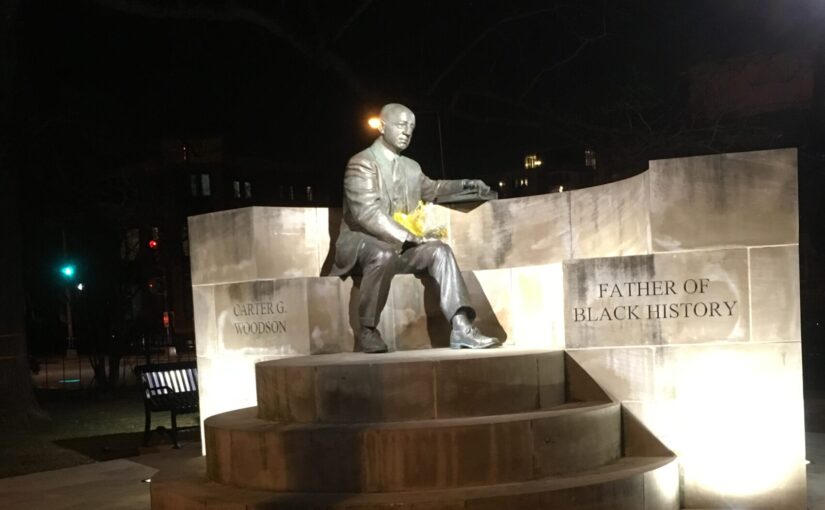It’s Black History Month, so I am continuing with the series of posts regarding Shaw resident and Father of Black History, Carter G. Woodson and his book The Mis-Education of the Negro, published in 1933.
Holy Moley I’m running out of month. Tomorrow is the 1st of March and I have two more chapters to finish. So sadly these last two chapters are going to be a bit more slap dash than I’d like.
Especially outside of the South, African Americans had the opportunity to vote before the Civil Rights movement of the 60s. So I believe it was those voters Woodson was thinking about when talking about the ‘New Negro’. “The New Negro in politics, moreover, must not be a politician. He must be a man. He must try to give the world something rather than extract something from it.”
This post is going to be rather short so I will post a few opening paragraphs from the chapter and the last two paragraphs. My own commentary is in choosing what sections to bold.
Another factor the Negro needs is a new figure in politics, one who will not concern himself so much with what others can do for him as with what he can do for himself. He will know sufficient about the system of government not to carry his trouble to the federal functionaries and thus confess himself a failure in the community in which he lives. He will know that his freedom from peonage and lynching will be determined by the extent that he can develop into a worthy citizen and impress himself upon his community.
The New Negro in politics will not be so unwise as to join the ignorant delegations from conferences and convention which stage annual pilgrimages to the White House to complain to the President because they have socially and economically failed to measure up to demands of self-preservation. The New Negro in politics will understand clearly that in the final analysis federal functionaries cannot do anything about these matters within the police powers of the states, and he will not put himself in the position of being received with coldness and treated with contempt as these ignorant misleaders of the Negro race have been from time immemorial. The New Negro in politics, then, will appeal to his own and to such friends of other races in his locality as believe in social justice. If he does something for himself others will do more for him.
The increasing vigor of the race, then, will not be frittered away in partisan strife in the interest of the oppressors of the race. It ought not to be possible for the political bosses to induce almost any Negro in the community to abandon his permanent employment to assist them and their ilk in carrying out some program for the selfish purposes of the ones engineering the scheme. It ought not to be possible for the politicians to distribute funds at the rate of fifty or a hundred dollars a head among the outstanding ministers and use them and their congregations in vicious partisan strife. It is most shameful that some ministers resort to religion as a camouflage to gain influence in the churches only to use such power for selfish political purpose.
The Negro should endeavor to be a figure in politics, not a tool for the politicians. This higher role can be played not by parking all of the votes of a race on one side of the fence as both blacks and whites have done in the South, but by independent action. The Negro should not censure the Republican party for forgetting him and he should not blame the Democratic party for opposing him. Neither can the South blame any one but itself for its isolation in national politics. Any people who will vote the same way for three generations without thereby obtaining results ought to be ignored and disfranchised.
and the last two:
Why should the Negro wait for some one from without to urge him to self-assertion when he sees himself robbed by his employer, defrauded by his merchant, and hushed up by government agents of injustice? Why wait for a spur to action when he finds his manhood insulted, his women outraged, and his fellowmen lynched for amusement? The Negroes have always had sufficient reason for being radical, and it looks silly to see them taking up the cause of others who pretend that they are interested in the Negro when they merely mean to use the race as a means to an end. When the desired purpose of these so-called friendly groups will have been served, they will have no further use for the Negro and will drop him just as the Republican machine has done.
The radicals bring forward, too, the argument that the Negro, being of a minority group, will always be overpowered by others From the point of view of the selfish elements this may be true, and certainly it has worked thus for some time; but things do not always turn out according to mathematical calculations. In fact, the significant developments in history have never been thus determined. Only the temporary and the trivial can be thus forecast. The human factor is always difficult for the materialist to evaluate and the prophecies of the alarmist are often upset Why should we expect less in the case of the Negro?

